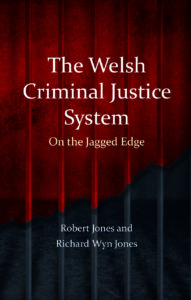Dr Bharat Malkani reviews Richard Wyn Jones and Robert Jones’ book The Welsh Criminal Justice System: On the Jagged Edge
It might initially seem odd to read about a ‘Welsh criminal justice system’, because the typical view is that although some law-making powers have been devolved to Wales, the justice system has not, and therefore there is no ‘Welsh criminal justice system’ to speak of.
Over seven immensely readable and eye-opening chapters, Robert Jones and Richard Wyn Jones do a remarkable job of dismantling this assumption, explaining that there is to all intents and purposes a distinctly Welsh criminal justice system. Using original data, interviews with a range of criminal justice practitioners, and case studies, the authors convincingly describe the distinctive features of criminal justice in Wales, which they describe as ‘structurally and endemically dysfunctional’ (p.171). They attribute these problems to the constitutional arrangements around the separation of powers, and for this reason, call for the justice system to be devolved in its entirety to Welsh governance. The Welsh Criminal Justice System sets out the unique constitutional arrangements around Welsh devolution, explaining that while some legislative and executive functions have been devolved, matters pertaining to criminal justice have not. The rest of the book reveals the problems that this unusual set of constitutional arrangements presents. This is because criminal justice does not operate in a vacuum, and there are many occasions when the practice of criminal justice involves aspects of social policy that have been devolved. In the authors’ words: ‘those institutions responsible for criminal justice simply cannot operate in isolation from broader frameworks and institutions of social policy, which in Wales are now almost all devolved.’ (p.7) It is hard to argue with this. There are many examples of devolved institutions of social policy which have an impact on criminal justice, including: mental health services, housing, the education system, and social services.
This set of affairs gives rise to the subtitle of the book: those who are responsible for administering criminal justice functions are constantly struggling to navigate the ‘jagged’ line that separates the responsibilities that have been devolved to Wales, and the responsibilities that are reserved to Westminster and Whitehall. As they write: ‘Given that criminal justice policy and the institutions primarily involved in upholding justice are inevitably embedded in, and umbilically linked to, a raft of other public institutions and related social policies, the Welsh criminal justice system straddles a jagged edge of devolved and non-devolved responsibilities.’ (pp.167-168)
To highlight these problems, the authors provide some much needed data on criminal justice as it operates in Wales specifically. Traditionally, statistics relating to rates of crime, arrests, convictions, and imprisonment cover ‘England and Wales’ together. Here, we get a picture of what is going on within Wales, and the numbers are startling. For example, we find out that Wales has a higher rate of incarceration than England, or any other country in Western Europe (p.33). The authors are quick to acknowledge the limitations of their approach to this sort of statistical analysis, as they have generally relied on Freedom of Information requests. However, their efforts illustrate the need for more nuanced data collection and analysis so that we can understand the distinctive aspects of criminal justice in the Welsh context.
With these statistics in mind, the authors explore how criminal justice matters are approached on either side of the ‘jagged edge’. First, the reader is taken on a tour of the approach and attitudes in London towards criminal justice in Wales. There is, to put it mildly, a stark lack of concern among policy-makers in London about the Welsh context. Criminal justice issues that are specific to Wales are ‘largely out of sight and out of mind’ among policy-makers based in Whitehall (p.56). Within Wales, we are told that the intentions to address Welsh-specific issues are there, but the powers to effectively address these matters are not.
To illustrate this, two case studies are provided: housing provision for former prisoners, and funding arrangements for police forces in Wales. Both these issues reveal in their different ways the problems with the current arrangements. Attempts to develop a progressive approach to housing former prisoners have been stymied by Wales’s subordinate role in ‘the English and Welsh justice system’, and the mixed sources of funding (some from the Welsh side of the jagged edge; some from the English side) has led to serious difficulties in the context of how much money is available, and how it is to be used by police forces in Wales. These case studies highlight the dysfunctional nature of the Welsh criminal justice system, and demonstrate that these problems are due to asymmetrical constitutional arrangements.
Discussions and debates that drive Wales forward.
Join Wales’ leading independent think tank.
Towards the end of the book, the authors explore how the problems with these unorthodox arrangements are exacerbated by the very systems that are in place to address these problems. The institutions and mechanisms for scrutinising the work of criminal justice agencies do not seem to understand the uniqueness of the Welsh context, and inspectorates (with perhaps the exception of HM Inspectorate of Prisons) routinely make recommendations that betray a misunderstanding of which powers are devolved, and which are not. In short, inspectors tend to assume that ‘England provides the norm against which Welsh forces are measured’ (p.146), but without recognizing the different contexts in which Welsh forces operate.
This book is particularly timely given the recent publication of the Report of the Commission on the UK’s Future, authored by former Labour Prime Minister Gordon Brown. The Report calls for youth justice and probation to be devolved to Wales, but from the analysis in this book, one can only conclude that such an approach would make the current situation worse. For example, probation and prisons are currently overseen and scrutinised by one executive agency covering England and Wales, and to devolve probation but not prisons would make little practical, political, or principled sense.
The institutions and mechanisms for scrutinising the work of criminal justice agencies do not seem to understand the uniqueness of the Welsh context
The authors ultimately argue that the justice system needs to be completely devolved to Wales, because the structural problems caused by ‘the jagged edge’ can only be surmounted by radical constitutional change. Although, as they recognize, devolution ‘is itself no panacea’ (p.186), they make a convincing case that devolution is a necessary step to fix some of the problems with the way criminal justice operates in Wales. Although full devolution of justice powers is not likely to occur in the near future, this important book is a vital contribution to a conversation about devolution that needs to be taking place now. It should be read, and taken seriously, by policy-makers who want to make criminal justice work for all of Wales.

The Welsh Criminal Justice System: On the Jagged Edge (2022)
Robert Jones, Richard Wyn Jones
All articles published on the welsh agenda are subject to IWA’s disclaimer.
This review was commissioned and edited by Maisie Allen, thank to the Book Council of Wales’ New Audiences Fund.





